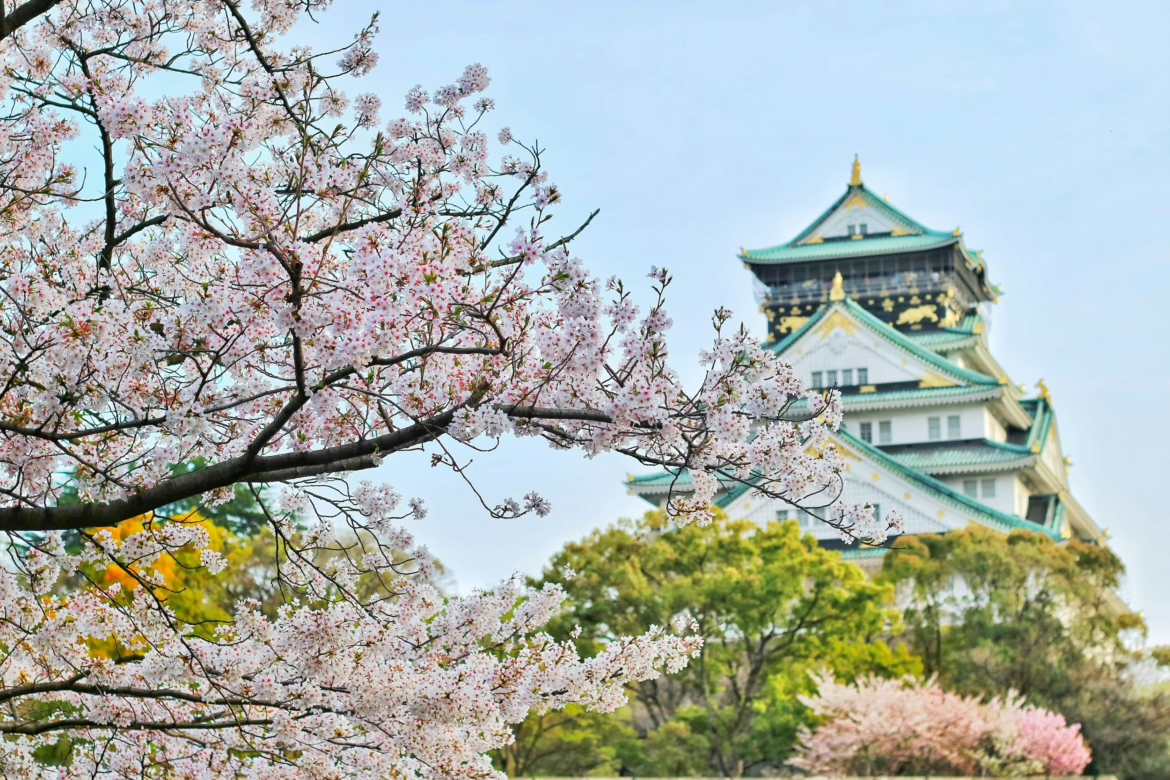What makes Japan so unforgettable that people feel drawn to return? Maybe it’s the stillness of a garden in Kyoto or the smell of fresh noodles drifting through a quiet alley. These aren’t just pleasant memories — they’re emotional anchors. According to the Japan National Tourism Organization, nearly 68% of international visitors in 2024 were repeat travelers. That’s more than a statistic. It points to something deeper. This article explores why tourists return to Japan, looking at the psychology of travel in Japan and the cultural richness that keeps people coming back.
The Data Behind the Trend
The number of repeat visitors to Japan isn’t just impressive. It’s a core part of the country’s tourism story. In 2024, nearly 68% of international travelers were returning for their second or third visit, according to aggregated industry data. Among visitors from Hong Kong and Taiwan, that number climbs even higher, with more than 70% having visited at least twice. While the Japan National Tourism Organization doesn’t publish detailed repeat-visit stats directly, their inbound tourism database offers a clear picture of visitor trends by region and year.
A regional breakdown shows this isn’t limited to East Asia. JNTO data highlights strong repeat travel from Singapore, Thailand, and Malaysia, while Australia and the United States see return rates between 50% and 60%. These aren’t isolated spikes—they reflect a steady rise over time.
Back in 2010, Japan welcomed just over 8 million international visitors. By 2019, that figure had surged to 32 million, and despite pandemic disruptions, 2024 marked a full rebound, with even stronger loyalty among past travelers.
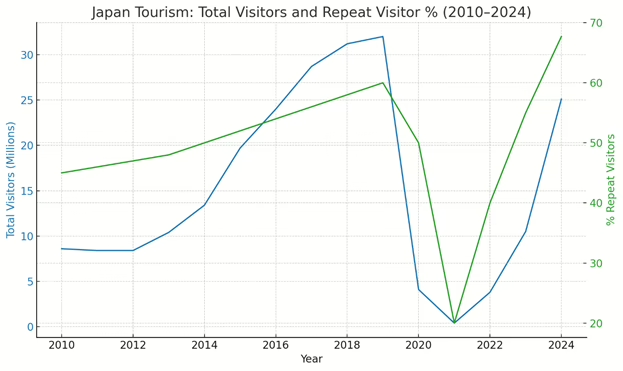
These numbers suggest Japan doesn’t just attract tourists—it earns their return.
The Psychology of Return Travel
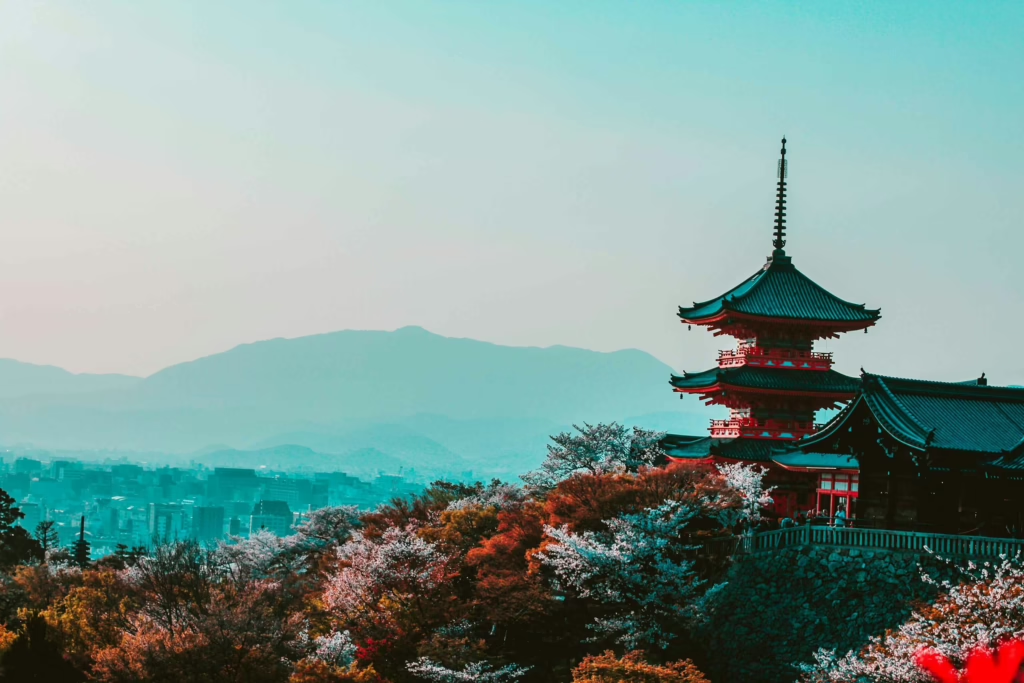
Travel memories don’t just sit in your mind. They live in your body. The scent of ramen after midnight in Shinjuku or the stillness of a Kyoto garden at dawn isn’t something you forget. These moments feel alive when you think back. That’s what makes Japan different.
In the psychology of travel in Japan, researchers often focus on experiential memory—how we remember the feeling of a trip more than the facts. It’s not the full itinerary that stays with us. It’s those flashes of emotion tied to specific moments.
This connects to the peak-end rule, the idea that we judge experiences by their most intense points and how they finish. Japan delivers both. Think of the rush of cherry blossoms in full bloom, the kindness of a stranger at a train station, or the quiet of a shrine at sunset. These emotional highs tend to linger and shape what we remember most.
Studies support this pattern. Researchers like Kim, Ritchie, and McCormick developed the “Memorable Tourism Experiences” scale, showing that the more vivid and emotional the memory, the more likely someone is to return. More recent research by Coudounaris found that travelers who recall small details like sounds, scents, or cultural interactions are more likely to plan another visit.
Japan is especially good at creating those kinds of memories. It offers surprise through neon-lit alleyways, ritual through tea ceremonies, and warmth through everyday hospitality. One trip doesn’t feel complete. It feels like the start of a story travelers want to continue.
Cultural Immersion as a Hook
Japan doesn’t just show you things. It pulls you into a rhythm—a way of moving, noticing, and interacting that feels unlike anywhere else. For many travelers, that’s the part that sticks. Once you’ve felt it, it’s hard not to want more.
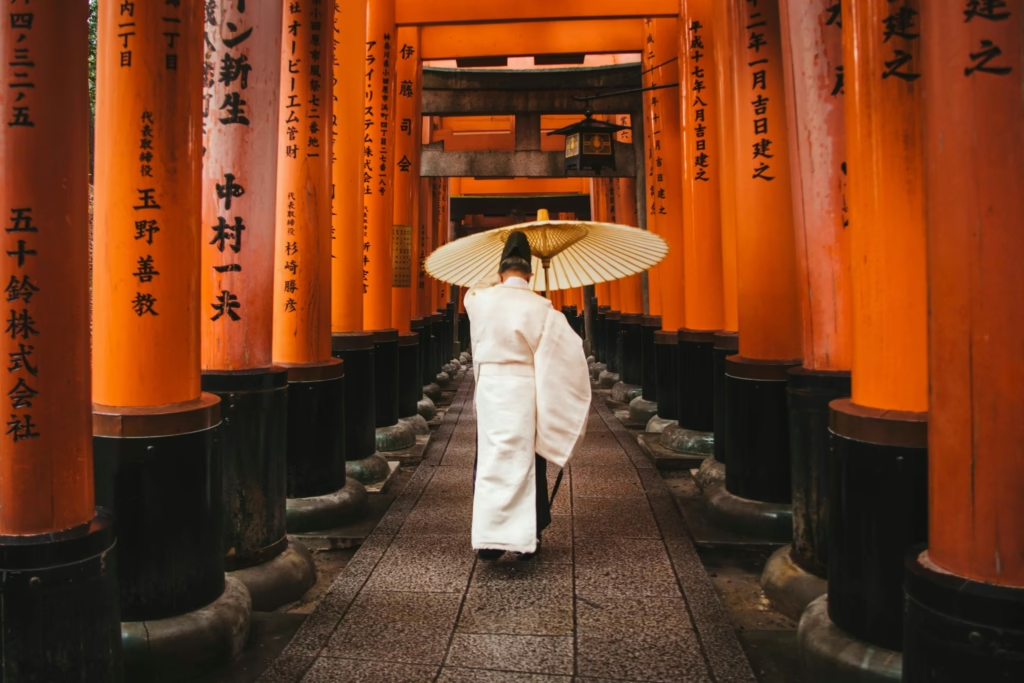
One of the strongest pulls is omotenashi, Japan’s quiet but deeply rooted approach to hospitality. It’s not loud or forced. It’s the way a shopkeeper walks you outside to return your change or a server sets your meal down with care, never interrupting your peace. These moments are small but deeply human. You don’t forget how they made you feel.
There’s also something quietly powerful about the daily rituals. Taking off your shoes before stepping into a home or soaking in silence at an onsen feels like more than just routine. It feels like respect for space, for time, for others. Even the gestures, like bowing, carry meaning you only begin to understand after being there.
Language plays its part too. Saying “arigatou” or “sumimasen” isn’t just about being polite. It’s a way of stepping into the culture, even if only briefly. Each word spoken makes the world around you feel a little more connected.
And then there’s the food. It’s not just about eating. It’s about slowing down. Savoring a piece of fresh takoyaki from a street stall or sitting quietly through a multi-course kaiseki meal feels like a lesson in presence. Each bite reflects the season, the region, and the hands that prepared it.
That’s the thing about cultural immersion in Japan. The more you see, the more you realize how much you’ve only started to understand. Each trip feels less like checking off a list and more like deepening a relationship. And that’s what keeps people coming back.
Marketing Insights: Psychology of Travel in Japan
Japan’s tourism appeal isn’t just about what it offers. It’s how it invites you to experience it. There’s an intention behind the way the country draws people in—one that’s quietly effective without ever feeling like a hard sell.
This intention is part of the broader psychology of travel in Japan—a subtle blend of emotional cues, cultural rhythms, and personal meaning that makes the experience feel deeper than a typical vacation.
Seasonal timing plays a big role. Japan doesn’t just advertise places—it highlights fleeting moments. Cherry blossoms, autumn leaves, snow-covered villages. Each season has its own magic, and visitors are encouraged to return at different times of year to catch what they missed. It’s not just about seeing Japan once. It’s about seeing it again through a different lens.
Even something practical like the JR Pass becomes part of the experience. It turns train travel into a kind of freedom, letting travelers roam beyond the big cities with ease. For people who’ve already been to Tokyo or Kyoto, it opens the door to new regions and quieter stories.
Japan also understands the joy of niche passions. Anime fans can follow real-world spots from their favorite series. Whether it’s a Studio Ghibli location or a backstreet in Akihabara, there’s a sense of discovery that keeps fans coming back to complete the journey.
What Japan does best is speak to emotion. Its travel campaigns focus less on checklists and more on feeling—stillness, wonder, joy, curiosity. It doesn’t just say, “Here’s what to see.” It asks, “How do you want to feel?”
That’s what sets it apart. The message is personal. And for travelers, that’s often what makes them want to return.
Segment Breakdown: Who Returns and Why in the Psychology of Travel in Japan
People return to Japan for all kinds of reasons. But underneath it all, it often comes down to how the country makes them feel. Whether it’s comfort, curiosity, or a sense of connection, the emotional pull is strong across different types of travelers. This emotional response is at the heart of the psychology of travel in Japan, shaping not just why people visit, but why they come back.
Cultural Enthusiasts
For those drawn to tradition, Japan feels like a living museum—temples tucked into hillsides, the quiet discipline of a tea ceremony, or the quiet streets of a geisha district after dusk. Visitors from Hong Kong, Taiwan, and other parts of East Asia often feel a cultural familiarity that keeps them coming back. But even for first-timers from farther away, there’s a sense of respect and depth that makes one visit feel like it barely scratched the surface.
Food Lovers
Japan has a way of turning meals into memories. It’s not just the sushi or ramen. It’s the way food connects to seasons, regions, and mood. One trip might be about street food in Osaka. Another could be about seafood markets in Hokkaido or a quiet kaiseki meal in Kyoto. Many travelers admit they plan entire returns just to eat—and they don’t regret it.
Nature Seekers
Japan surprises a lot of people with its natural beauty. You don’t just come for cherry blossoms or autumn colors—you come for the rhythm of it all. Hot spring villages, misty mountains, coastal drives. Visitors from Australia and Europe often return to explore regions they didn’t reach the first time, chasing that calm, scenic version of Japan they didn’t know existed.
Pop Culture Fans
For anime and manga lovers, Japan feels like home before they’ve even arrived. First visits might be about seeing big spots like Akihabara or Ghibli Park. But follow-up trips often dive deeper into real-world locations from beloved series, tucked-away merch shops, or events that only happen once a year. It’s less about checking things off and more about building a connection to something they already love.
Across all these groups, the pattern is the same: people come back because something resonated. And they want to feel it again, or maybe find something new they missed the first time.
What Other Countries Can Learn
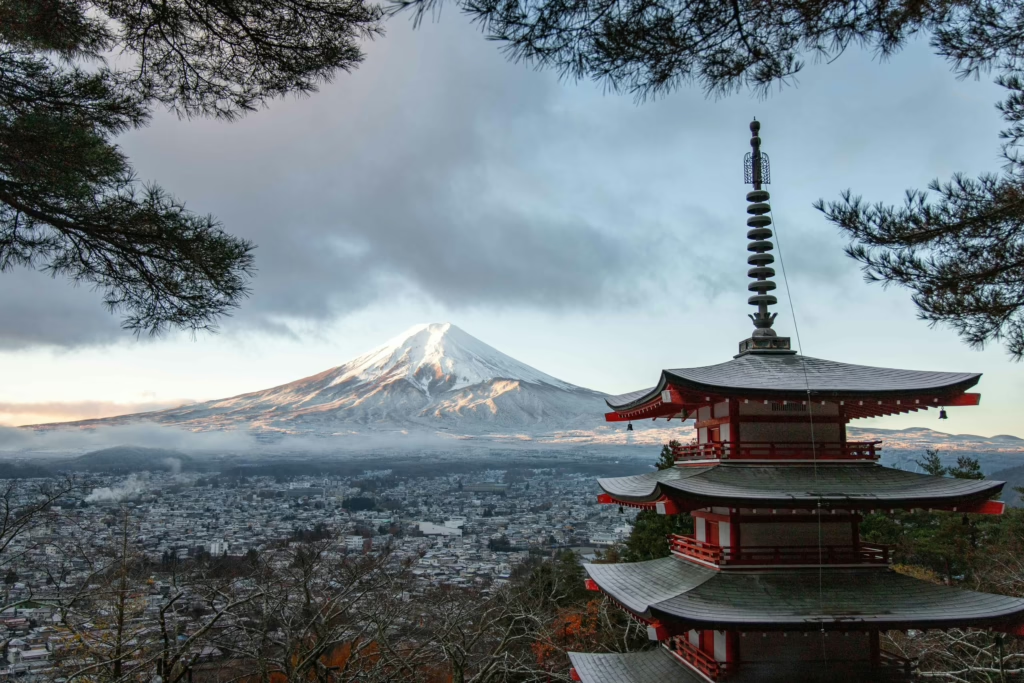
Japan doesn’t just attract tourists. It earns their loyalty. That kind of repeat travel doesn’t happen by accident. It’s the result of thoughtful choices that leave a lasting impression.
One of the biggest takeaways? Don’t aim for a perfect first impression. Aim for connection. Japan doesn’t rush to impress with flashy attractions. It invites visitors to slow down, notice the details, and feel something real. The psychology of travel in Japan is built on that emotional connection—one that quietly encourages people to return.
Other destinations could benefit from doing the same. Instead of pushing a checklist of top sights, focus on how a place feels. Build moments that stay with people. Through ritual, through story, through small sensory details, they’ll carry something home with them.
Think about how someone might talk about their trip a year later. Is it just a blur of activities? Or did something actually stay with them? The goal isn’t just to get people there once. It’s to make them want to come back.
When a country makes travelers feel something personal, it stops being a vacation and starts becoming part of someone’s life story.
Why One Visit Isn’t Enough: The Psychology of Travel in Japan
Japan isn’t just a popular destination. It’s a place people return to again and again because it leaves a lasting impression. The psychology of travel in Japan plays a quiet but powerful role, blending emotional connection, cultural richness, and thoughtful tourism design. The beauty, the flavors, the hospitality, and the sense of being part of something meaningful all come together to create a trip that feels personal and hard to forget.
Now that you’ve seen what keeps travelers coming back, ask yourself this: Would you return to Japan, and what would you go back for?
